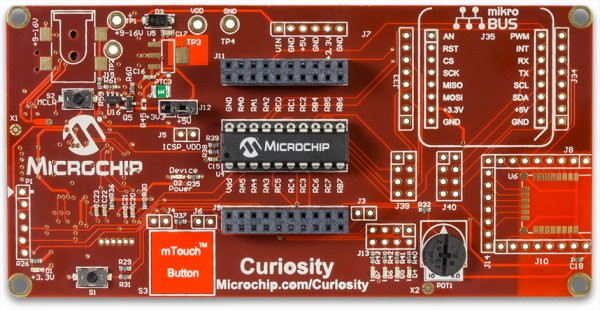Satisfy Your Curiosity
Your next embedded design idea has a new home. Curiosity is a cost-effective, fully integrated 8-bit development platform targeted at first-time users, Makers, and those seeking a feature-rich rapid prototyping board. Designed from the ground-up to take full advantage of Microchip’s MPLAB X development environment, Curiosity includes an integrated programmer/debugger, and requires no additional hardware to get started.
Your Tool for Function Enablement
Curiosity is the perfect platform to harness the power of modern 8-bit PIC® Microcontrollers. Its layout and external connections offer unparalleled access to the Core Independent Peripherals (CIPs) available on many newer 8-bit PIC MCUs. These CIPs enable the user to integrate various system functions onto a single MCU, simplifying the design and keeping system power consumption and BOM cost low.Curiosity Development Kit Board
Internet of Things Ready
Have an IoT design idea? Curiosity can make it real. Out of the box, the development board offers several options for user interface – including physical switches, an mTouch™ capacitive button, and an on-board potentiometer. A full complement of accessory boards is available via the MikroElectronika Mikrobus™ interface footprint. In addition, Bluetooth Low Energy communication can easily be added using an available Microchip RN4020 module.
Check back frequently for code updates
[tabs]
[tab title=”Code”]
[/tab]
[tab title=”Documentation”]
[/tab]
[tab title=”Supported Devices”]
| Device | Data Sheet |
Pin Count | Sample | Description |
|---|---|---|---|---|
| PIC12F1501 |  |
8 | 1.75KB Flash, 64B RAM, 6 I/O, CLC, CWG, NCO, 10-bit ADC | |
| PIC12F1571 |  |
8 | 1.75KB, 128 RAM, 16-bit PWM, Comparator, DAC, ADC, CWG | |
| PIC12F1572 |  |
8 | 3.5KB, 256 RAM, 16-bit PWM, Comparator, DAC, ADC, CWG, EUSART | |
| PIC12F1612 |  |
8 | 3.5KB Flash, 256 RAM, 32MHz Int. Osc, 10bit ADC, ZCD, WWDT, CRC | |
| PIC12F1822 |  |
8 | 3.5 KB Flash, 128 bytes RAM, 32 MHz Int. Osc, 6 I/0 | |
| PIC12F1840 |  |
8 | 7 KB Flash, 256 bytes RAM, 32 MHz Int. Osc, 6 I/0 | |
| PIC12LF1552 |  |
8 | 3.5 KB Flash, 256 bytes RAM, 16 MHz Int. Osc, 6 I/0, 10-Bit ADC | |
| PIC16F1503 |  |
14 | 3.5KB Flash, 128B RAM, 12 I/O, CLC, CWG, NCO, 10-bit ADC | |
| PIC16F1507 |  |
20 | 3.5KB Flash, 128B RAM, 18 I/O, CLC, CWG, NCO, 10-bit ADC | |
| PIC16F1508 |  |
20 | 7KB Flash, 256B RAM, 18 I/O, CLC, CWG, NCO, 10-bit ADC | |
| PIC16F1509 |  |
20 | 14KB Flash, 512B RAM, 18 I/O, CLC, CWG, NCO, 10-bit ADC | |
| PIC16F1574 |  |
14 | 7KB, 512B RAM, HEF, 16b PWM, Comparator, 10b ADC, 5b DAC, CWG, PPS, EUSART | |
| PIC16F1575 |  |
14 | 14KB, 1KB RAM, HEF, 16b PWM, Comparator, 10b ADC, 5b DAC, CWG, PPS, EUSART | |
| PIC16F1578 |  |
20 | 7KB, 512B RAM, HEF, 16b PWM, Comparator, 10b ADC, 5b DAC, CWG, PPS, EUSART | |
| PIC16F1579 |  |
20 | 14KB, 1KB RAM, HEF, 16b PWM, Comparator, 10b ADC, 5b DAC, CWG, PPS, EUSART | |
| PIC16F1613 |  |
14 | 3.5KB Flash, 256 RAM, 32MHz Int. Osc, 10bit ADC, ZCD, WWDT, CRC | |
| PIC16F1614 |  |
14 | 7KB Flash, 512 RAM, 32MHz Int. Osc, 10bit ADC, ZCD, WWDT, CRC | |
| PIC16F1615 |  |
14 | 14KB Flash, 1K RAM, 32MHz Int. Osc, 10-bit ADC, ZCD, WWDT, CRC | |
| PIC16F1618 |  |
20 | 7KB Flash, 512 RAM, 32MHz Int. Osc, 10-bit ADC, ZCD, WWDT, CRC | |
| PIC16F1619 |  |
20 | 14KB Flash, 1K RAM, 32MHz Int. Osc, 10bit ADC, ZCD, WWDT, CRC | |
| PIC16F1703 |  |
14 | 3.5KB Flash, 256B RAM, 10b ADC, OPAmp, CCP, ZCD, PPS, I2C/SPI | |
| PIC16F1704 |  |
14 | 7KB Flash, 512B RAM, HS Comp, 10b ADC, OPAmp, 8b DAC, CCP, PWM, COG, ZCD, CLC, PPS, EUSART, I2C/SPI | |
| PIC16F1705 |  |
14 | 14KB Flash, 1KB RAM, HS Comp, 10b ADC, OPAmp, 8b DAC, CCP, PWM, COG, ZCD, CLC, PPS, EUSART, I2C/SPI | |
| PIC16F1707 |  |
20 | 3.5KB Flash, 256B RAM, 10b ADC, OPAmp, CCP,ZCD, PPS, I2C/SPI | |
| PIC16F1708 |  |
20 | 7KB Flash, 512B RAM, HS Comp, 10b ADC, OPAmp, 8b DAC, CCP, PWM, COG, ZCD, CLC, PPS, EUSART, I2C/SPI | |
| PIC16F1709 |  |
20 | 14KB Flash, 1KB RAM, HS Comp, 10b ADC, OPAmp, 8b DAC, CCP, PWM, COG, ZCD, CLC, PPS, EUSART, I2C/SPI | |
| PIC16F1769 |  |
14 | 7KB Flash, 512 RAM, 10bit DAC, Op Amp, ZCD, PRG, 3xCLC,COG, 100mA I/Os, PPS, 10/16-bit PWMs | |
| PIC16F1764 |  |
14 | 7KB Flash, 512 RAM, 10bit DAC, Op Amp, ZCD, PRG, 3xCLC,COG, 100mA I/Os, PPS, 10/16-bit PWMs | |
| PIC16F1765 |  |
14 | 14KB Flash, 1KB RAM, 10bit DAC, Op Amp, ZCD, PRG, 3xCLC, COG, 100mA I/Os, PPS, 10/16-bit PWMs | |
| PIC16F1768 |  |
20 | 7KB Flash, 512 RAM, 10bit DAC, 2xOp Amp, 2xCOG, 3xCLC, ZCD, 2xPRG, 100mA I/Os, PPS, 2×10/16-bit PWMs | |
| PIC16F1769 |  |
20 | 14KB Flash, 1KB RAM, 10bit DAC, 2xOp Amp, 2xCOG, 3xCLC, ZCD, 2xPRG, 100mA I/Os, PPS, 2×10/16-bit PWMs | |
| PIC16F1823 |  |
14 | 3.5 KB Flash, 128 bytes RAM, 32 MHz Int. Osc, 12 I/0 | |
| PIC16F1824 |  |
14 | 7 KB Flash, 256 bytes RAM, 32 MHz Int. Osc, 12 I/0 | |
| PIC16F1825 |  |
14 | 14 KB Flash, 1K bytes RAM, 32 MHz Int. Osc, 12 I/0 | |
| PIC16F1828 |  |
20 | 7 KB Flash, 256 bytes RAM, 32 MHz Int. Osc, 18 I/0 | |
| PIC16F1829 |  |
20 | 14 KB Flash, 1K bytes RAM, 32 MHz Int. Osc, 18 I/0 | |
| PIC16F18313 |  |
8 | 3.5KB, 256 RAM, 256 EEPROM, 10b ADC, Comparator, 5b DAC, 10b PWM, CCP, CLC, NCO, CWG, PPS | |
| PIC16F18323 |  |
14 | 3.5KB, 256 RAM, 256 EEPROM, 10b ADC, Comparator, 5b DAC, 10b PWM, CCP, CLC, NCO, CWG, PPS | |
| PIC16F18324 |  |
14 | 7KB, 512B RAM, 256B EEPROM, 10b ADC, Comparator, 5b DAC, 10b PWM, CCP, CLC, NCO, CWG, PPS, EUSART, SPI, I2C | |
| PIC16F18325 |  |
14 | 14KB, 1KB RAM, 256B EEPROM, 10b ADC, Comparator, 5b DAC, 10b PWM, CCP, CLC, NCO, CWG, PPS, EUSART, SPI, I2C | |
| PIC16F18344 |  |
20 | T7KB, 512B RAM, 256B EEPROM, 10b ADC, Comparator, 5b DAC, 10b PWM, CCP, CLC, NCO, CWG, PPS, EUSART, SPI, I2C | |
| PIC16F18345 |  |
20 | 14KB, 1KB RAM, 256B EEPROM, 10b ADC, Comparator, 5b DAC, 10b PWM, CCP, CLC, NCO, CWG, PPS, EUSART, SPI, I2C | |
| PIC16LF1554 |  |
14 | 7KB Flash, 512B RAM, 12 I/Os, 2x 10-bit ADC, I2C, UART, 2x PWM | |
| PIC16LF1559 |  |
20 | 14KB Flash, 512B RAM, 18 I/Os, 2x 10-bit ADC, I2C, UART, 2x PWM | |
| PIC18F13K22 |  |
20 | 8KB Flash, 256bytes RAM, 256bytes EEPROM | |
| PIC18F14K22 |  |
20 | 16KB Flash, 512bytes RAM, 256bytes EEPROM |
[/tab]
[tab title=”Associated Boards”]
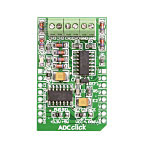
DIGIPOT Click is an add-on board in the mikroBUS™ form factor. It features a single-channel, digital potentiometer device (MCP4161) with 8-bit resolution (256 wiper steps) and the industry-standard SPI serial interface. The resistance value of the digital potentiometer goes up to 10 kΩ. This board features outstanding AC/DC characteristics and low-power consumption. It can be used in audio equipment, servo-motor control, battery charging and control, LCD contrast control, programmable filters, and more.
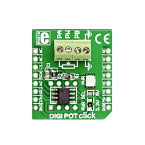
DAC Click is an add-on board in the mikroBUSâ„¢ form factor. It includes a 12-bit, Digital-to-Analog Converter device (MCP4921) that features an optional 2x buffered output and SPI interface. The board provides high accuracy and low-noise performance for industrial applications where calibration or compensation of signals such as temperature, pressure, and humidity are required. The board is set to use the 3.3V power supply by default. You may solder the PWR SEL SMD jumper to the 5V position for use with 5V systems.
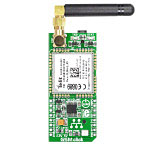
GSM Click is an add-on board in the mikroBUSâ„¢ form factor. It is a perfect solution for adding a GSM/GPRS communication layer to your device. It features a Telit GL865-QUAD GSM/GPRS module which supports the GSM/GPRS 850/900/1800/1900 MHz Quad-band frequency. The board contains the TXB0106, a 6-bit bidirectional voltage-level translator, as well as a SIM-card socket. GSM Click communicates with the target microcontroller via seven mikroBUSâ„¢ lines RX, TX, INT, PWM, CS, RST and AN. The board can use either 3.3V or 5V of power. The LED diode indicates the presence of the power supply.
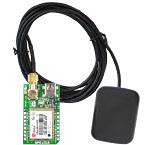
GPS Click is an add-on board in the mikroBusâ„¢ form factor. Its a compact solution for adding GPS functionality to your device. It features the LEA-6S, high-performance u-blox 6 positioning engine. The board can interface with a microcontroller via UART or I2C, or data can be acquired using the PC application via USB. The board features a connector that is compatible with active and passive antennas. It can operate on 3.3V of power only.
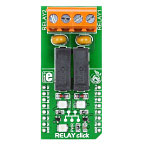
RELAY Click is an add-on board in the mikroBusâ„¢ form factor. The board features two G6D1AASI-5DC power relay modules, screw terminals for connecting external loads up to 5A, 250V AC/30V DC, and on-board transistors to drive the relays.
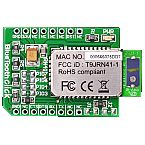
Bluetooth Click is an accessory board in the mikroBusâ„¢ form factor. Enrich your design with bluetooth capability with up to 100m range. Board offers low power, highly economic Bluetooth radio for adding wireless capability to your products. On-board RN-41 module with UART interface is easy and simple to use. Board is designed to use 3.3V power supply only. Features include:
- Simple UART communication interface
- Fully qualified Bluetooth 2.1/2.0/1.2/1.1 module
- Low power 30mA connected, less then 10mA sniffmode
[/tab]
[/tabs]
Curiosity Development Kit Board Price: USD per Unit:20.00
Key Features
- Supports 8-, 14-, 20-pin 8-bit PIC® Microcontrollers with low voltage programming capability
- Integrated Programmer/Debugger with USB Interface
- Integrates seamlessly with MPLAB X IDE and Code Configurator
- Various user interface options – mTouch button, analog potentiometer, and physical switches
- Mikrobus™ support with over 100 MikroElectronika Click™ add-on boards available
- RN4020 Bluetooth module footprint


